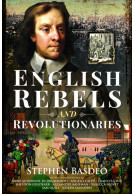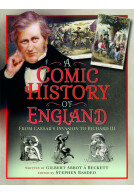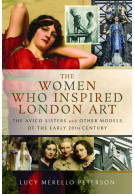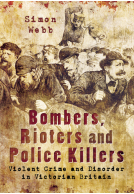Heroes and Villains of the British Empire (Paperback)
Their Lives and Legends
Imprint: Pen & Sword History
Pages: 240
ISBN: 9781526749390
Published: 28th July 2020
(click here for international delivery rates)
Need a currency converter? Check XE.com for live rates
| Other formats available | Price |
|---|---|
| Heroes and Villains of the British… ePub (12.3 MB) Add to Basket | £6.99 |
From the sixteenth until the twentieth century, British power and influence gradually expanded to cover one quarter of the world’s surface. The common saying was that “the sun never sets on the British Empire”. What began as a largely entrepreneurial enterprise in the early modern period, with privately run joint stock trading companies such as the East India Company driving British commercial expansion, by the nineteenth century had become, especially after 1857, a state-run endeavour, supported by a powerful military and navy. By the Victorian era, Britannia really did rule the waves.
Heroes and Villains of the British Empire is the story of how British Empire builders such as Robert Clive, General Gordon, and Lord Roberts of Kandahar were represented and idealised in popular culture. The men who built the empire were often portrayed as possessing certain unique abilities which enabled them to serve their country in often inhospitable territories, and spread what imperial ideologues saw as the benefits of the British Empire to supposedly uncivilised peoples in far flung corners of the world. These qualities and abilities were athleticism, a sense of fair play, devotion to God, and a fervent sense of duty and loyalty to the nation and the empire. Through the example of these heroes, people in Britain, and children in particular, were encouraged to sign up and serve the empire or, in the words of Henry Newbolt, “Play up! Play up! And Play the Game!”
Yet this was not the whole story: while some writers were paid up imperial propagandists, other writers in England detested the very idea of the British Empire. And in the twentieth century, those who were once considered as heroic military men were condemned as racist rulers and exploitative empire builders.
I found Heroes & Villains to be a quick and engaging read about a pivotal period in British history. It's interesting to learn how the population viewed the empire from within, as it grew, thrived and eventually collapsed.
Rambles
Read the full review here
By the Victorian era, Britannia indisputably ruled the waves. Basdeo tells the story of how British Empire builders such as Robert Clive, General Gordon, and Lord Roberts of Kandahar were represented and idealised in popular culture. The men who built the empire were often portrayed as possessing certain unique abilities which enabled them to serve their country in often inhospitable territories, and spread what imperial ideologues saw as the benefits of the British Empire to supposedly uncivilised peoples in far flung corners of the world. These qualities and abilities were athleticism, a sense of fair play, devotion to God, and a fervent sense of duty and loyalty to the nation and the empire. While some may look on them in a different light today, they have a place in our history and should be seen in the context of their times and contributory to our culture today.
Julian Stockwin
Read the full review here
As featured on the Royal Reviewer YouTube channel
Royal Reviewer
Listed in competition feature
Yorkshire Reporter, September 2020
It's a thought-provoking book, one that will help all of us better understand the world in which our ancestors lived and died.
Lost Cousins
Read the full review here
Stephen Basdeo’s book takes us on a well informed and interesting journey through centuries of opinion on Empire. Ideas on Empire evolved, mutated, changed and diverged throughout that period. There has never been an agreed history on Empire nor on its Empire builders. There have been views of Empire that helped shape and were shaped by the imperial experience. This is what makes it so fascinating. The Empire may have come and gone but views and arguments about it have long outlived the institution itself - and long may they continue to do so.
The British Empire
Read the full review here
This brilliant collection of British Empire heroes and villains is the kind of thing I was reading back in the 1950s - Boys' Own Paper stuff - truly terrific!
Books Monthly
The author in my opinion is fair and does mention both sides of the argument when talking about the various individuals, both negative and positive. The fact that some of them would now be seen as less popular given recent events in popular culture that were around at the time such as slavery and exploitative behaviour. This was a thoroughly good read that I enjoyed which was away from norm. This book has excellent illustrations and there is a very good sources section and bibliography near the back after the authors’ conclusion.
UK Historian
⭐⭐⭐⭐
Read the full review here
Rating: 5 out of 5 stars
NetGalley, Karen Meeus
A nuanced and in-depth analysis of the literary representation of real-life heroes and villains in the age of British imperialism, and how the morals of the time were reflected in both high-brow and more “commercial” literary works. Definitely a very fascinating book which has left me curious and eager to read more about both several of the figures and events that were mentioned throughout. The illustrations and many quotes & references to contemporary sources made this an engaging as well as an interesting read. It is very informative, yet never too dry, nor too sensationalist. The facts are objectively represented, and the author clearly illustrates that even then there were opposing views on matters such as slavery, nationalist pride, colonialism… that are still controversial to this day, unfortunately. Recommend.
Who gets to define what makes a hero or a villain? Stephen Basdeo provides the reader with a quick introduction into the history of the Empire and then goes on to showing how the perception of what constitutes as a hero or villain shifted over the decades. Literary representations from politicians to highwaymen formed popular opinions that are still found in media today, from Quatermain movies to romanticised pirates.
NetGalley, Anja Kwiatkowski
The book is heavily illustrated and an engaging read, a nice companion to current news about statues being taken down in order to finally come to terms with the Empire's legacy.
About Stephen Basdeo
Stephen Basdeo is a historian and the author of several history books and academic journal articles. He has also co-edited and published transcriptions of primary sources for academic publishers.
Death of Sir Francis Drake
28th January 1596
Francis Drake was a sea captain and explorer of the Elizabethan era from Tavistock, Devon. He was knighted by Elizabeth I. The Spanish branded him a pirate, known to them as 'El Draque'. He was buried at sea and divers continue to search for the coffin. He was regarded by people in the nineteenth century as one of the heroes of the empire. Died 28 January 1596 in Panama.





















